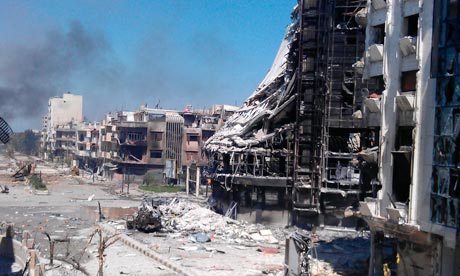Baku, Azerbaijan, Oct. 16
By Elena Kosolapova - Trend:
It is unlikely that the conflict in Syria will be resolved in the near future, on the contrary, it will probably aggravate, said Joe Barnes, expert of the Rice University's James A. Baker III Institute for Public Policy in Houston, Texas and former diplomat with the US State Department.
"I am not holding my breath for any short-term solution [for Syria crisis]. I suspect we have a lot of fighting and more chaos to come," Barnes told Trend.
The expert noted that clearly some sort of compromise that sees [Syrian president] Assad depart and a power-sharing arrangement between elements of the current Assad regime and the various opposing groups is the only peaceful solution at this point.
"But the problem is how to achieve such a compromise, given the bitterness of the struggle and the fractured nature of the opposition," Barnes said.
Speaking on Russia's intervention in Syria, the expert said that its length will depend much upon its success in propping up the Assad government. Meanwhile Barnes believes Russia is unlikely to deploy forces sufficient to give Assad outright victory.
On September 30, Russia began air strikes on IS in Syria following Syrian President Bashar Assad's request for military assistance.
"It is possible that Putin will simply "declare victory" and withdraw after a few tactical successes," Barnes said.
However the expert noted that at this point, a Russian exit strategy is unclear. Moreover he stressed that interventions are tricky things: once embarked upon, they are hard to end.
"See the U.S. intervention in Afghanistan, now 14 years old and counting," Barnes said.
The expert believes that Russia and Western coalition leaded by the US will probably be able to coordinate their military activities in Syria to the extent that they can avoid any possible incidents involving coalition and Russian aircraft. But, he said, it is unlikely anything much more since the US and Russian objectives in Syria may overlap but they also conflict.
"While Moscow and Washington are united in their opposition to ISIS, Putin sees the maintenance of the Assad government as a solution to the Syrian crisis; Washington sees Assad as part of the problem," he noted.
Barnes also noted that a key player in the Syrian civil war is Iran and this is unlikely to change. Iran has long been deeply involved in supporting the Assad government and already provides financing, arms and advisors, he said.
"This was made clear by the recent death of Iranian General Hossein Hamedani outside Aleppo," he said.
Brigadier General of Iran's elite Islamic Revolution Guards Corps Hossein Hamedani was killed by ISIS militants on Oct. 8. He was advising the Syrian army in its fight against extremists at the request of Syrian authorities. Many media outlets had said that a commander of such high rank could not be alone in Syria and he apparently managed numerous Iranian troops.
Barnes also said that it can be expected that Iran and Russia will coordinate their activities in Syria.
Syria has been suffering an armed conflict on its soil since March 2011, which, according to the UN, has so far killed over 250,000 people and displaced nearly half of the population. Militants from various armed groups are confronting Syrian government troops. The militants of the extremist groups known as "Islamic State" and Jabhat al-Nusra are the most active ones.
Edited by T.T.
Follow the author on Twitter: @E_Kosolapova






